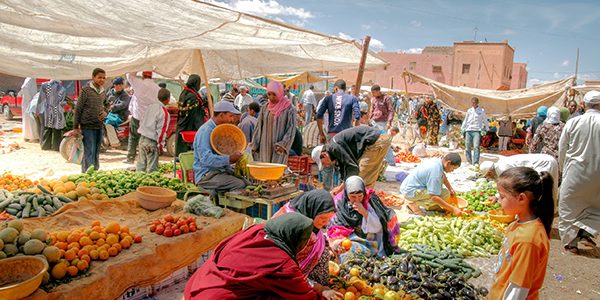[:en]Strategies and food consumption models, relations between food, culture, territory and religion, sensorial and neurocognitive aspects are elements strongly connected and have a consistent impact on both chain productions and society well-being.
Research activities and services of this area are addressed to the analysis of consumption patterns, socio-territorial and socio-cultural factors related to food, and the assessment of the food system’s societal impacts with the final purpose of providing operative supports to realize appropriate food for contemporary society and more sustainable and inclusive food systems, accessible also by most vulnerable citizens.
[:it]Strategie e modelli di consumo alimentare, relazioni tra cibo, cultura, territorio e religione, aspetti sensoriali e neurocognitivi sono elementi fortemente connessi e hanno un impatto consistente su entrambe le produzioni a catena e sul benessere della società.
Le attività e i servizi di ricerca di quest'area sono indirizzati all'analisi dei modelli di consumo, fattori socio-territoriali e socio-culturali legati al cibo e alla valutazione dell'impatto sociale del sistema alimentare con l'obiettivo finale di fornire supporti operativi per realizzare alimenti appropriati per società contemporanea e sistemi alimentari più sostenibili e inclusivi, accessibili anche dai cittadini più vulnerabili.
[:]
[:en]General Referent[:it]Referente Generale[:]
[:en]Food and culture[:it] Cibo e cultura [:]

[:en]Food production, preparation and consumption should be considered from a local perspective, in relation to patterns of resource use and the socio-cultural dimensions of agro-pastoral production, with a view to enhancing the social and ecological sustainability of the production chain.
Furthermore, understanding the socio-cultural relations between food, diets, social groups, and territories means first coming to terms with the modern-day divide between food and those who consume it, between the areas where food is produced and the cultural systems to which it belongs. It is key to explaining new food and dietary habits, bringing to light the value of specific products and their peculiarities, designing suitable marketing strategies, and developing connections among individual life stories, collective lifestyles, food aesthetics, and what we refer to as “local traditions”.
[:it]La produzione, la preparazione e il consumo di cibo dovrebbero essere considerati da una prospettiva locale, in relazione ai modelli di utilizzo delle risorse e alle dimensioni socio-culturali della produzione agro-pastorale, al fine di migliorare la sostenibilità sociale ed ecologica della catena produttiva.
Inoltre, comprendere le relazioni socio-culturali tra cibo, diete, gruppi sociali e territori significa innanzitutto venire a patti con la divisione moderna tra cibo e coloro che la consumano, tra le aree in cui il cibo viene prodotto e i sistemi culturali a cui appartiene . È la chiave per spiegare nuove abitudini alimentari e alimentari, portando alla luce il valore di prodotti specifici e le loro peculiarità, progettando strategie di marketing adeguate e sviluppando connessioni tra storie di vita individuali, stili di vita collettivi, estetica del cibo e ciò che chiamiamo "locale" tradizioni".
[:]
[:en]RESEARCH REFERENT[:it]REFERENTE[:]
TEAM
Ilaria Grazzani - Biographies and nutrition histories
Stefania Ulivieri - Biographies and nutrition histories
Ivan Bargna- Anthropology of Food
Silvia Barberani - Anthropology of Food
Luca Rimoldi- Anthropology of Food
Mauro Van Aken- Anthropology of Food- Anthropology of Food
Gianmarco Navarini - Wine & Food Cultures
Laura Formenti - Food and Education
Silvia Mari - Social Psychology
Lorenzo Domaneschi- Food and Wine Culture
Elisabetta Nigris- Food and Education
Emanuela Bricolo - Psychology
Sara Zizzarri - Elderly's food access and habits
[:en]Nutritional style and food governance[:it]Stili nutrizionali e governance

[:en]Food accessibility, the knowledge of the supply and consumption strategies, and needs and preferences of various metropolitan populations are crucial aspects to provide products which can address deficiencies, meet consumers’ interests, and plan an appropriate food supply.
Starting from these information it is possible to enhance both the product range and the diet variety, and to define new strategies of food governance suitable for the local context and the targeted consumers.
[:it]L'accessibilità al cibo, la conoscenza delle strategie di approvvigionamento e consumo, i bisogni e le preferenze delle varie popolazioni metropolitane sono aspetti cruciali per fornire prodotti in grado di affrontare le carenze, soddisfare gli interessi dei consumatori e pianificare un approvvigionamento alimentare adeguato. A partire da queste informazioni è possibile migliorare sia la gamma di prodotti che la varietà alimentare e definire nuove strategie di governance alimentare adatte al contesto locale e ai consumatori mirati.
[:]
[:en]RESEARCH REFERENT[:it]REFERENTE[:]
TEAM
Matteo Colleoni - Food styles
Luca Daconto - Food accessibility
Nunzia Borrelli - Food policy & governance
Marco D'Addario - Lifestyle change, health and well-being. Risk perception and risk communication
Massimo Miglioretti - Lifestyle change, well-being, health promotion and occupational health
Massimiliano Rossetti - Food and sustainability
Cristina Zogmaister - Psychometrics
[:en]Food territory and development [:it] Cibo, territorio e sviluppo [:]

[:en]Food is a key driver of the local socio-economic development, and it is an important factor of territorial attractiveness, which can attract tourists looking for typical culinary experiences and flavors.
The analysis of the relations between producers and consumers, local food networks, and enogastronomic tourism is therefore crucial to the development of innovative, sustainable and embedded in the territory food economies.
[:it]Il cibo è un fattore chiave dello sviluppo socio-economico locale, ed è un importante fattore di attrattività territoriale, che può attrarre turisti alla ricerca di esperienze e sapori culinari tipici.
L'analisi delle relazioni tra produttori e consumatori, reti alimentari locali e il turismo enogastronomico è quindi fondamentale per lo sviluppo di economie alimentari innovative, sostenibili e integrate nel territorio.
[:]
[:en]RESEARCH REFERENT[:it]REFERENTE[:]
TEAM
Matilde Ferretto - Tourism and local devolpment
David Benassi - Food territorial economy
Raffaele Matacena - Alternative food networks
Annastella Gambini - Food and innovative Learning
Silvia Mugnano - Tourism and local community
Nadia Oliviero - Consumer detriment assessment, consumer protection, behavioural change and persuasion for health promotion, ICTs
[:en]Food History and Economics[:it] Cibo, storia ed economia [:]

[:en]Members of this section study the food economics and history from the Modern Age to the new Millennium both in macro-level and specific cases. Their researches in particular concern:
-The effect of the public institutions’ choices (the rules they promulgate and the policies they follow) on the production and distribution of the food and its healthy (from the ancient annona to the Common Agricultural Policy in the EEC/EU), the food law and governance and the European food certifications and their societal impact;
-The causes and consequences of the scarcity / excess of food and water both in pre-industrial societies and in contemporary markets: in particular in the Lombard town and in the Alpine valleys (16th – 20th centuries).
The evolution of the production systems and technology, of the quantity / quality of the rural products and their market: in particular the wine, the dairy products, the olive oil, the cereals, the honey (17th – 21th centuries).
-The relevance for the food market of the protection of the quality of products and the effects of changes concerning consumers’ tastes and customs (18th – 21th centuries)
-The consumer preference for food and the marketing concerning the food and the cookware and the evolution of laws regulating the agri-food industry, the food markets, the packaging and the advertising (19th-21st centuries)
-The promotion and development of the sustainable tourism in World Heritage Sites and the gastronomic tourism.
-The economic rationality, economic ethics, the experimental economics and the neuro-economics related to the purchase and consumption of food.
[:it]I membri di questa sezione studiano l'economia e la storia del cibo dall'età moderna al nuovo millennio, sia in casi specifici che a livello macro. Le loro ricerche riguardano in particolare:
- L'effetto delle scelte delle istituzioni pubbliche (le regole che promulgono e le politiche che seguono) sulla produzione e distribuzione del cibo e del suo benessere (dall'annona antica alla politica agricola comune nella CEE / UE), la legislazione alimentare e governance e le certificazioni alimentari europee e il loro impatto sociale;
-Le cause e le conseguenze della scarsità / eccesso di cibo e acqua sia nelle società preindustriali che nei mercati contemporanei: in particolare nella città lombarda e nelle valli alpine (XVI-XX secolo). L'evoluzione dei sistemi produttivi e della tecnologia, della quantità / qualità dei prodotti rurali e del loro mercato: in particolare il vino, i latticini, l'olio d'oliva, i cereali, il miele (XVII - XXI secolo) .
- La rilevanza per il mercato alimentare della protezione della qualità dei prodotti e gli effetti dei cambiamenti riguardanti i gusti e le abitudini dei consumatori (XVIII - XXI secolo)
-La preferenza del consumatore per il cibo e il marketing riguardo al cibo e al pentolame e l'evoluzione delle leggi che regolano l'industria agroalimentare, i mercati alimentari, il packaging e la pubblicità (XIX-XXI secolo) -La promozione e lo sviluppo della sostenibilità turismo nei siti patrimonio dell'umanità e turismo gastronomico.
-La razionalità economica, l'etica economica, l'economia sperimentale e la neuro-economia legate all'acquisto e al consumo di cibo.
[:]
[:en]RESEARCH REFERENT[:it]REFERENTE[:]
TEAM
Garbelli Maria Emilia - Marketing
Mellinato Giulio - Food history
Mocarelli Luca - Food history
Prosperi Laura - Food history
Rizzi Maria Grazia - Food history
Tedeschi Paolo - Food history
Stefania Ottone - Economics, neuroeconomics
Auretta Benedetti - Food security; food certifications; public contracts
Camilla Buzzacchi - Government and the regulation of food and agricoltural markets
Christian Garavaglia - Industrial organization
Matteo Pelagatti - Statistics
[:en]Food and cognitive neuroscience[:it]Cibo e neuroscienze cognitive [:]

[:en]Just as as other stimuli in the environment different aspects of food are represented by our brain in its complex networks, in order to produce certain beliefs, memories and behaviors. Cognitive neuroscience has revealed much about how the brain integrates information from multiple sources to create our perception of the external world.
In order to promote healthy diets, it is essential to understand consumers’ perceptions of and responses to new and old foods. Cognitive neurosciences can offer theories and advanced research techniques to address this aspect from a scientific point of view.
The different features of a product, such as its color, shape, smell, tactile feel, sound and so on, are rarely processed in isolation by our neural system.
A neurocognitive analysis of consumers’ multisensory perceptions of food allows to promote new food or ways of consumption and improve the diets of modern society. This analysis also needs to take into account demographic aspects, such as age, given that the sensorial, motivational and cognitive processing by the brain changes a lot from youth to elderness, leading to different taste, preferences and behaviors. Only by taking into account all of these aspects it will be possible to fully understand habits, choices, necessities and limitations of the whole population with respect to food consumption.
[:it]Proprio come altri stimoli nell'ambiente, diversi aspetti del cibo sono rappresentati dal nostro cervello nelle sue reti complesse, al fine di produrre certe credenze, ricordi e comportamenti. La neuroscienza cognitiva ha rivelato molto sul modo in cui il cervello integra le informazioni provenienti da più fonti per creare la nostra percezione del mondo esterno. Per promuovere diete sane, è essenziale comprendere le percezioni e le risposte dei consumatori ai cibi nuovi e vecchi. Le neuroscienze cognitive possono offrire teorie e tecniche di ricerca avanzate per affrontare questo aspetto da un punto di vista scientifico.
Le diverse caratteristiche di un prodotto, come il colore, la forma, l'odore, il tatto tattile, il suono e così via, raramente vengono elaborate isolatamente da il nostro sistema neurale.
Un'analisi neurocognitiva delle percezioni multisensoriali del cibo da parte dei consumatori consente di promuovere nuovi alimenti o modi di consumo e migliorare le diete della società moderna. Questa analisi deve anche prendere in considerazione aspetti demografici, come l'età, dato che l'elaborazione sensoriale, motivazionale e cognitiva da parte del cervello cambia molto dalla giovinezza all'anziano, portando a gusti, preferenze e comportamenti diversi. Solo tenendo conto di tutti questi aspetti sarà possibile comprendere pienamente le abitudini, le scelte, le necessità e le limitazioni dell'intera popolazione in relazione al consumo di cibo.
[:]
